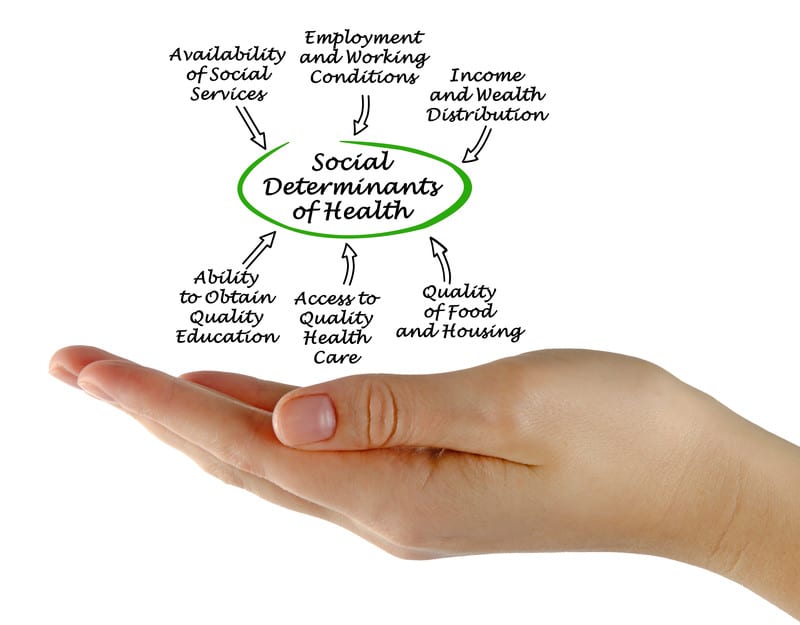The American Hospital Association (AHA) refers to social determinants as societal and environmental conditions such as food, housing, transportation, education, violence, social support, health behaviors and employment. These factors are proven to impact a patient’s ability to engage with the healthcare industry and achieve good health. With the goal of ensuring that the patients are getting the right care in the right place and at the right time, many health insurance companies are now providing payments for diverse services ranging from food and nutrition to housing. Thus it is also critical for hospitals and health systems to document data related to social determinants of health (SDOH) to improve the health of their communities. Based on physician’s records, medical billing companies can assist hospitals in documenting social determinants of health.
Addressing social determinants can improve patient care and promote health. The December 2018 report from Waystar showed that 68%of Americans were identified having challenges in at least one SDOH risk category. Also, of all patients in the “high risk” segment, 60% have never discussed their issues with a provider or their insurance company.
The 2014 Country Health Rankings report has found that nearly 80% of a person’s health is influenced by non medical issues such as food, housing, transportation, and the financial means to pay for medications, utilities and other services.
SDOH ICD-10-CM codes
These social factors can be documented using the ICD-10-CM codes included in categories Z55-Z65, which identify persons with potential health hazards related to socioeconomic and psychosocial circumstances.
- Z55 – Problems related to education and literacy
- Z56 – Problems related to employment and unemployment
- Z57 – Occupational exposure to risk factors
- Z59 – Problems related to housing and economic circumstances
- Z60 – Problems related to social environment
- Z63 – Other problems related to primary support group, including family circumstances
- Z64 – Problems related to certain psychosocial circumstances
- Z65 – Problems related to other psychosocial circumstances
Why ICD-10-CM Code Categories Z55-Z65 Were Not Used Well?
Though these codes were available early,
- inpatient settings were not using them frequently for discharges other than to document mental health and alcohol/substance use
- a clear difference exists between the number of identifiable social factors, a provider’s ability to address them and documentation with billing and diagnosis codes
- coding professionals cannot report these codes unless they were supported by physician documentation, in most hospitals societal and environmental conditions are routinely documented and addressed by non-physician providers
However, to promote widespread use of these codes, the AHA Coding Clinic published advice in early 2018 that allows the reporting of codes from categories Z55-Z65, based on information documented by all clinicians involved in the care of the patient.
American Medical Association (AMA) and UnitedHealthcare (UNH) Propose More New Codes
With nearly two dozen new ICD-10 codes related to social determinants of health (SDOH), UnitedHealthcare and the AMA are supporting the expansion of the healthcare system’s perspective to emphasize patient’s social needs too, not just medical care.
These codes that better incorporate social determinants of health into healthcare delivery were submitted to the ICD-10 Coordination and Maintenance Committee. This committee is a federal body that includes members from the Centers for Disease Control (CDC) and the Centers for Medicare & Medicaid Services (CMS).
Proposed new codes include
- Z55.5 Less than a high school degree
- Z55.6 High school diploma or GED
- Z56.84 Unemployed but not seeking work
- Z56.85 Employed part time or temporary
- Z56.86 Employed full time
- Z59.6 Low Income (New subcategory)
- Z59.61 Unable to pay for prescriptions
- Z59.62 Unable to pay for utilities
- Z59.63 Unable to pay for medical care
- Z59.65 Unable to pay for phone
- Z59.66 Unable to pay for adequate clothing
- Z59.67 Unable to find or pay for child care
- Z59.69 Unable to pay for other needed item
- Z59.91 Worried about losing housing
- Z60.81 Unable to deal with stress
- Z60.82 Inadequate social interaction – limited to once or twice a week
- Z60.83 Can hardly ever count on family and friends in times of trouble
- Z60.84 Feeling unsafe in current location
- Z60.85 Stressed quite a bit or very much
- Z60.86 Stressed somewhat
Just like other ICD-10 codes, these new codes would be an integral part of a patient’s electronic medical record and claims history. These new codes also activate referrals to social and government services to address people’s unique needs, thus connecting them directly to local and national resources in their communities. Medical coding services provided by professional companies can help healthcare providers get their SDOH ICD-10 documentation tasks done without error.




